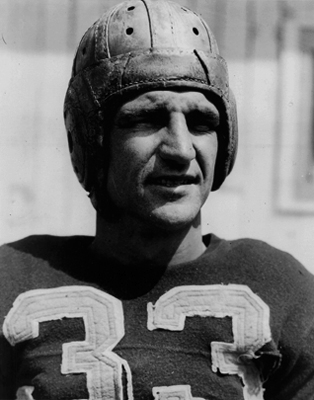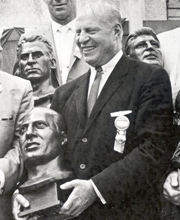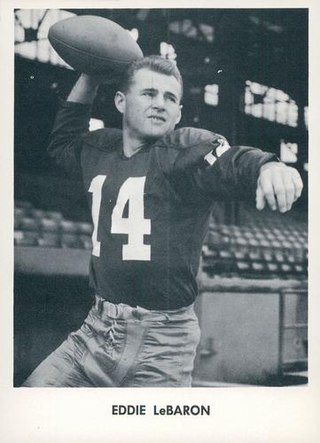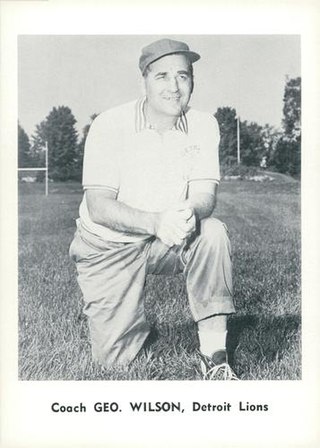Related Research Articles
Sidney Luckman was an American professional football player who was a quarterback for the Chicago Bears of the National Football League (NFL) from 1939 through 1950. During his twelve seasons with the Bears, he led them to four NFL championships.

Samuel Adrian Baugh was an American professional football player and coach. During his college and professional careers, he most notably played quarterback, but also played as a safety and punter. He played college football for the Horned Frogs at Texas Christian University, where he was a twice All-American. He then played in the National Football League (NFL) for the Washington Redskins from 1937 to 1952. After his playing career, he served as a college coach for Hardin–Simmons University before coaching professionally for the New York Titans and the Houston Oilers.

Gale Eugene Sayers was an American professional football player who was both a halfback and return specialist in the National Football League (NFL). In a relatively brief but highly productive NFL career, Sayers spent seven seasons with the Chicago Bears from 1965 to 1971, though multiple injuries effectively limited him to five seasons of play. He was known for his elusiveness and agility and was regarded by his peers as one of the most difficult players to tackle.

Clyde Douglas "Bulldog" Turner was an American football player and coach. He was elected, as a player, to the College Football Hall of Fame in 1960 and the Pro Football Hall of Fame in 1966. He was also selected in 1969 to the NFL 1940s All-Decade Team.

Peter Louis Pihos was an American football player and coach.

Robert Stanton Waterfield was an American professional football player and coach. He played quarterback for the UCLA Bruins and Cleveland/Los Angeles Rams and was inducted into the Pro Football Hall of Fame in 1965. His No. 7 jersey was retired by the Los Angeles Rams in 1952. He was also a motion picture actor and producer.

Charles Robert Taylor was an American professional football player who was a wide receiver for 13 seasons with the Washington Redskins of the National Football League (NFL). After playing college football for the Arizona State Sun Devils, he was selected by Washington in the first round of the 1964 NFL Draft. With Taylor, the Redskins made the playoffs five times and reached the Super Bowl once (VII), after the 1972 season. A six-time All-Pro and eight-time Pro Bowl selection, he was inducted into the Pro Football Hall of Fame in 1984.
The 1946 NFL season was the 27th regular season of the National Football League. Before the season, Elmer Layden resigned as NFL Commissioner and Bert Bell, co-founder of the Philadelphia Eagles, replaced him. Meanwhile, the All-America Football Conference was formed to rival the NFL, and the Rams became the first NFL team based on the West Coast after they relocated from Cleveland, Ohio, to Los Angeles, California. A regular season game was played on Tuesday, the last until the 2010 season, on October 1, between New York and Boston.

Clifford Franklin Battles was an American football halfback in the National Football League (NFL). Battles was inducted into the Pro Football Hall of Fame in 1968.

Edward Wayne LeBaron Jr. was a Korean War veteran and an American football quarterback in the National Football League (NFL) for the Washington Redskins and Dallas Cowboys. He played college football at the College of the Pacific. He also was an executive vice president of the Atlanta Falcons.

George William Wilson, Sr. was a professional football end and later a coach for the National Football League (NFL)'s Detroit Lions and the American Football League (AFL)'s Miami Dolphins. Wilson attended and played football at Northwestern University. He went undrafted in 1937, before being signed by the Chicago Bears. Wilson played for ten seasons with the Bears, compiling overall record of 111 pass receptions, 1,342 receiving yards, and fifteen touchdowns. He was a member of the Bears during their five appearances in the National Football League Championship Game from 1940–1943 and 1946. Additionally, he was selected for the NFL All-Star Game from 1940–1942. He also played one season of professional basketball for the Chicago Bruins in 1939–40. Wilson won seven championships combined as a player and coach.

Raymond Vincent Buivid was an American football player who played quarterback in the National Football League (NFL) for the Chicago Bears.
The 1942 NFL Championship Game was the tenth title game of the National Football League (NFL), played at Griffith Stadium in Washington, D.C. on December 13, with a sellout capacity attendance of 36,006.
The 1937 NFL Championship Game was the fifth championship game of the National Football League (NFL), held December 12 at Wrigley Field in Chicago with an attendance of 15,878. The game featured the Western Division champions Chicago Bears (9–1–1) and the Eastern Division champions Washington Redskins (8–3).

The 1943 NFL Championship Game was the 11th annual title game of the National Football League (NFL), held at Wrigley Field in Chicago on December 26 with an attendance of 34,320. In a rematch of the previous year's game, the Western Division champion Chicago Bears (8–1–1) met the Eastern Division champion Washington Redskins (6–3–1). The previous week, the Redskins had defeated the New York Giants at the Polo Grounds in a playoff game by a score of 28–0 to determine the champs of the east, after the teams ended the regular season with identical records. The Redskins had dropped their final three regular season games, including two to the Giants. Even though the Giants had swept the season series with Washington, the rules of the time called for a tiebreaker game.
The 1943 season was the Chicago Bears' 24th in the National Football League. The team failed to match on their 11–0 record from 1942 and finished at 8–1–1, under temporary co-coaches Hunk Anderson and Luke Johnsos. On the way to winning the Western Division, the Bears were, yet again, denied a chance at an undefeated season by the defending champion Redskins in Washington. The Bears had their revenge in the NFL title game and defeated the Redskins at Wrigley Field to claim their sixth league title. It was their third championship in four years, establishing themselves as the pro football dynasty of the early 1940s.
The 1937 Washington Redskins season was the franchise's 6th season in the National Football League (NFL) and their first in Washington, D.C. The Boston Redskins moved to Washington after their runner-up 1936 season and became the Washington Redskins. In 1937 they repeated as Eastern Division champions and played the NFL championship game on the road against the Chicago Bears at Wrigley Field. The Redskins won the championship game, 28–21.
The 1940 NFL Championship Game, sometimes referred to simply as 73–0, was the eighth title game of the National Football League (NFL). It was played at Griffith Stadium in Washington, D.C. on December 8, with a sellout capacity attendance of 36,034.
The 1940 National Football League All-star Game (December) was the professional football league's third all-star game. The game pitted the Chicago Bears, the league's champion for the 1940 season, against a team of all-stars. The game was played on Sunday, December 29, 1940, at Gilmore Stadium in Los Angeles, California before an overflow crowd of 21,000, with members of the Stanford and Nebraska football teams also in attendance; the two were scheduled to play in the Rose Bowl, with Nebraska using the All-Star Game to research the Bears' T formation, which was being used by Stanford head coach and former Bears assistant Clark Shaughnessy. The Bears defeated the All-Stars by a score of 28–14.
The 1940 All-Pro Team consisted of American football players chosen by various selectors for the All-Pro team of the National Football League (NFL) for the 1940 NFL season. Teams were selected by, among others, the so-called "official" All-Pro team selected by 92 sports writers who were members of the Pro Football Writers Association of American (PFW), the sports writers of the Associated Press (AP), the United Press (UP), the International News Service (INS), Collyer's Eye (CE), the New York Daily News (NYDN), and the Chicago Herald American.
References
- 1 2 "Dudley's 97-yard Run Helps All-Stars Beat Redskins, 17–14". Pittsburgh Post-Gazette . AP. December 28, 1942. pp. 14–15. Retrieved February 15, 2012.
- ↑ "Pro Bowl Game Approved By National Grid League". The Palm Beach Post . Associated Press. June 4, 1950. Retrieved January 26, 2019– via Newspapers.com.
- 1 2 3 "Pro All-Stars Confident They Can Beat Redskins". Milwaukee Journal . Associated Press. December 26, 1942. p. 10. Retrieved February 15, 2012.
- 1 2 3 "All-Stars Set to Go Against the Redskins". Home News Tribune . Associated Press. December 26, 1942. Retrieved January 26, 2019– via Newspapers.com.
- ↑ "Don Hutson to Play With the All-Stars Against Washington". The Morning Call . Associated Press. December 18, 1942. Retrieved January 26, 2019– via Newspapers.com.
- ↑ "Sammy Baugh Denies Running Out on Game". Los Angeles Times . Associated Press. December 29, 1942. Retrieved February 24, 2019– via Newspapers.com.
- 1 2 3 4 5 Meier, Ted (December 28, 1942). "All-Stars Beat Redskins; Investigate Failure Of Baugh To Appear For Tilt". The Journal Standard . Associated Press . Retrieved January 26, 2019– via Newspapers.com.
- ↑ "Baugh Faces League's Discipline, Mates' Wrath". Detroit Free Press . December 28, 1942. Retrieved January 26, 2019– via Newspapers.com.
- ↑ McCann, Dick (December 28, 1942). "Baugh Misses Pro Bowl, Rouses Redskins' Ire". New York Daily News . Retrieved January 26, 2019– via Newspapers.com.
- ↑ "Redskin Boss Thinks Baugh Wanted to Play". The Courier-Journal . Associated Press. December 29, 1942. Retrieved January 26, 2019– via Newspapers.com.
- ↑ International News Service (December 29, 1942). "Artoe Defends Sammy Baugh". Mansfield News Journal . Retrieved January 26, 2019– via Newspapers.com.
- ↑ International News Service (January 20, 1943). "Layden Drops Charges Against Sammy Baugh". Salt Lake Telegram. Retrieved January 26, 2019– via Newspapers.com.
- ↑ "Artoe's 43-Yard Field Goal Sends Redskins to 17-14 Defeat". Detroit Free Press . Associated Press. December 28, 1942. Retrieved January 26, 2019– via Newspapers.com.
- ↑ "Redskin-Bear Feud Flares into Fistics; Luckman Roughed". The Morning Post. December 28, 1942. Retrieved January 26, 2019– via Newspapers.com.
- ↑ "1942 NFL Pro Bowlers". Pro-football-reference.com. Archived from the original on December 6, 2011. Retrieved February 16, 2012.
- ↑ "1942 Washington Redskins roster". Pro-football-reference.com. Archived from the original on February 10, 2012. Retrieved February 16, 2012.
- 1 2 3 4 5 "Layden Names Pro League's All-Star Squad". Meriden Record . AP. December 15, 1942. p. 11. Retrieved February 16, 2012.